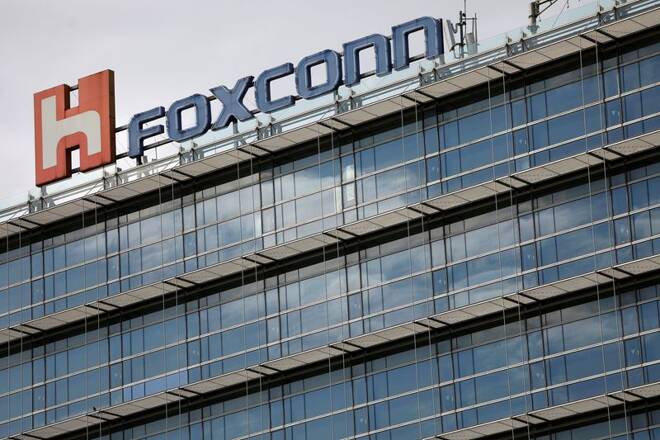Advertisement
Advertisement
Exclusive-Output of Apple iPhones at major China plant could fall 30% amid COVID curbs -source
By:
TAIPEI (Reuters) - Apple supplier Foxconn's COVID-19 woes at its vast iPhone manufacturing facility in China's Zhengzhou city could slash the site's November iPhone shipments by up to 30%,
By Yimou Lee
TAIPEI (Reuters) – Production of Apple Inc’s iPhones could slump by as much as 30% at one of the world’s biggest factories next month due to tightening COVID-19 curbs in China, a person with direct knowledge of the matter said on Monday.
Manufacturer Foxconn, formally Hon Hai Precision Industry Co Ltd, is working to boost production at another factory in Shenzhen city to make up for the shortfall, said the person, declining to be identified as the information was private.
Its main Zhengzhou plant in central China, which employs about 200,000 people, has been rocked by discontent over stringent measures to curb the spread of COVID-19, with several workers fleeing the site over the weekend.
The possible impact on production comes amid a traditionally busy time for electronics makers ahead of the year-end holiday season, which is also a prime time for vendors such as Apple.
Foxconn on Sunday said it was bringing the situation under control and would coordinate back-up production with other plants to reduce any potential impact. Its share price closed down 1.4% on Monday versus a 1.3% rise in the broader market.
Apple did not respond to a request for comment.
Foxconn is Apple’s biggest iPhone maker, producing 70% of iPhone shipments globally, which in turn makes up 45% of the Taiwanese firm’s revenue, analysts at Taipei-based Fubon Research said this month.
It also builds the device in India, but its Zhengzhou factory assembles the majority of its global output.
A second person familiar with the situation said many workers remained at the Zhengzhou plant and that production was continuing.
GRAPHIC – More than half of Apple’s revenue is from iPhone sales
https://graphics.reuters.com/HEALTH-CORONAVIRUS/FOXCONN-CHINA/zjpqjqargvx/chart.png
STRICT COVID-19 MEASURES
Under China’s ultra-strict zero-COVID-19 policies, localities must act swiftly to quell outbreaks, with measures including full-scale lockdowns.
Factories in affected areas are often allowed to stay open on condition they operate under a “closed loop” system where staff live and work on-site. Businesses have said such arrangements pose numerous difficulties.
Foxconn on Oct. 19 banned dining at canteens at the Zhengzhou plant and required workers to eat meals in dormitories. It said production was normal.
The measures led to people who said they worked at the site venting frustration about their treatment and provisions via social media.
Scores fled the site over the weekend, with photographs and videos on social media purporting to show Foxconn staff trekking across fields in daytime and along roads at night. Reuters could not immediately verify the authenticity of the posts.
Foxconn has not disclosed whether any workers at the Zhengzhou site had been diagnosed with COVID-19. Authorities have since Oct. 19 reported 264 locally transmitted COVID-19 cases in Zhengzhou, the capital of central Henan province.
Foxconn implemented closed loop measures in March and July this year at its smaller Shenzhen factory as cases in the southern city rose.
In May, the Shanghai plant of another Apple supplier, MacBook assembler Quanta Computer Inc, was also hit by worker chaos after the discovery of COVID-19 cases despite a closed-loop system being put in place.
(Reporting by Yimou Lee; Additional reporting by Brenda Goh; Editing by Gerry Doyle and Christopher Cushing)
About the Author
Reuterscontributor
Reuters, the news and media division of Thomson Reuters, is the world’s largest international multimedia news provider reaching more than one billion people every day. Reuters provides trusted business, financial, national, and international news to professionals via Thomson Reuters desktops, the world's media organizations, and directly to consumers at Reuters.com and via Reuters TV. Learn more about Thomson Reuters products:
Latest news and analysis
Advertisement
